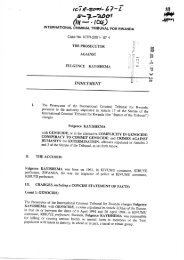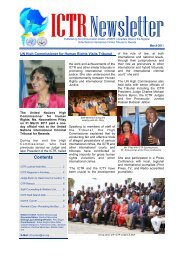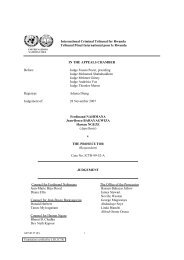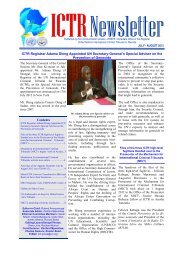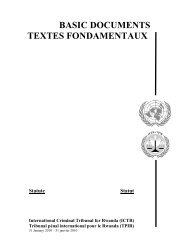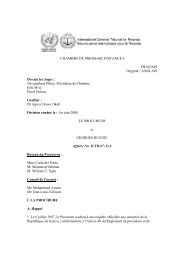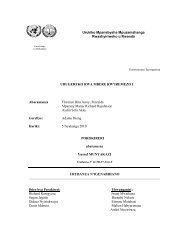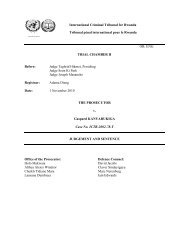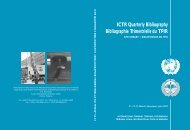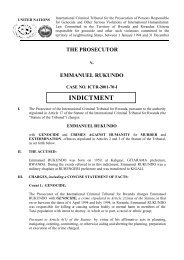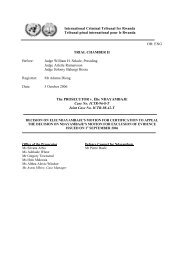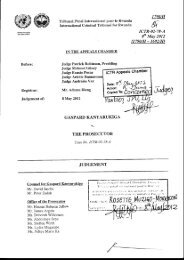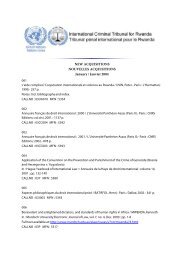Report of Proceedings - International Criminal Tribunal for Rwanda
Report of Proceedings - International Criminal Tribunal for Rwanda
Report of Proceedings - International Criminal Tribunal for Rwanda
You also want an ePaper? Increase the reach of your titles
YUMPU automatically turns print PDFs into web optimized ePapers that Google loves.
which has both <strong>of</strong> these groups in attendance – represents an ideal opportunity to brainstorm<br />
other solutions to the difficulties <strong>of</strong> international criminal investigation.<br />
The problem <strong>of</strong> victim protection is equally thorny. Again, Mr. Ocampo noted the excellent<br />
job that the ICTR has done in setting new standards <strong>for</strong> the treatment <strong>of</strong> victims and in finding<br />
ways <strong>of</strong> helping them to come <strong>for</strong>ward. Mr. Ocampo noted that the victims <strong>of</strong> massive crimes<br />
suffer terribly and it is incumbent upon the international justice system that they not be<br />
traumatised further. At the same time, they need to be identified and contacted <strong>for</strong> the eventual<br />
prosecution <strong>of</strong> those most responsible <strong>for</strong> the crimes being investigated. The ICC also has a<br />
new duty: victims need to be in<strong>for</strong>med that they can participate in trials and seek<br />
compensation.<br />
While this new role <strong>for</strong> victims is a positive development, in Mr. Ocampo’s view, it also<br />
raises some new and challenging questions. Who counts as the victim <strong>of</strong> a crime and thus can<br />
ask <strong>for</strong> compensation? Is it only victims <strong>of</strong> violence, or can those displaced by violence be<br />
counted also? If so, how can they all be compensated? What about victims whose testimony is<br />
ultimately not included in the prosecutor’s proceedings but their cases were investigated?<br />
Should they also be compensated, and if so, how can their compensation be determined if their<br />
cases do not figure in the trial?<br />
Mr. Ocampo would like to see a community solution to the compensation problem. In other<br />
words, individual victims would not be compensated but instead larger populations, through<br />
the provision <strong>of</strong> schools, hospitals, and other needed resources. In this way, justice will also<br />
rein<strong>for</strong>ce development.<br />
The push <strong>for</strong> international criminal courts to leave behind a legacy responds to a similar<br />
question: what happens in post-conflict societies after justice is achieved? Mr. Ocampo quoted<br />
UN Secretary General K<strong>of</strong>fi Annan, who suggested that any future criminal tribunal must give<br />
essential consideration to its intended legacy in the country concerned. This sets very high<br />
standards, indeed, <strong>for</strong> international justice, remarked Mr. Ocampo. According to this scenario,<br />
the evaluation <strong>of</strong> criminal tribunals, including the ICC, may not be based on their procedures or<br />
convictions or decisions, or on their ability to investigate and prosecute, or even on the skill <strong>of</strong><br />
legal argument used in the courtroom. They may be evaluated instead on the impact they leave<br />
“on the ground.”<br />
While Ocampo is sympathetic to those who call <strong>for</strong> a local impact — he thinks it is an<br />
understandable expectation — he also considers that such an impact is not necessarily the work<br />
<strong>of</strong> a court. How can a judicial institution trans<strong>for</strong>m a lawless situation, in which massive crimes<br />
have been committed, into one where the rule <strong>of</strong> law is respected? A court cannot do this alone.<br />
This is where the calculus <strong>of</strong> independence and inter-dependence comes into play.<br />
<strong>International</strong> criminal tribunals must be independent in the way they per<strong>for</strong>m their work,<br />
faithful to their mandates and impervious to undue outsid e influence. Yet they also,<br />
paradoxically, must foster inter-dependence with national entities in order to per<strong>for</strong>m their<br />
important work. Mr. Ocampo pointed out that he has a huge jurisdiction. He can investigate<br />
5




